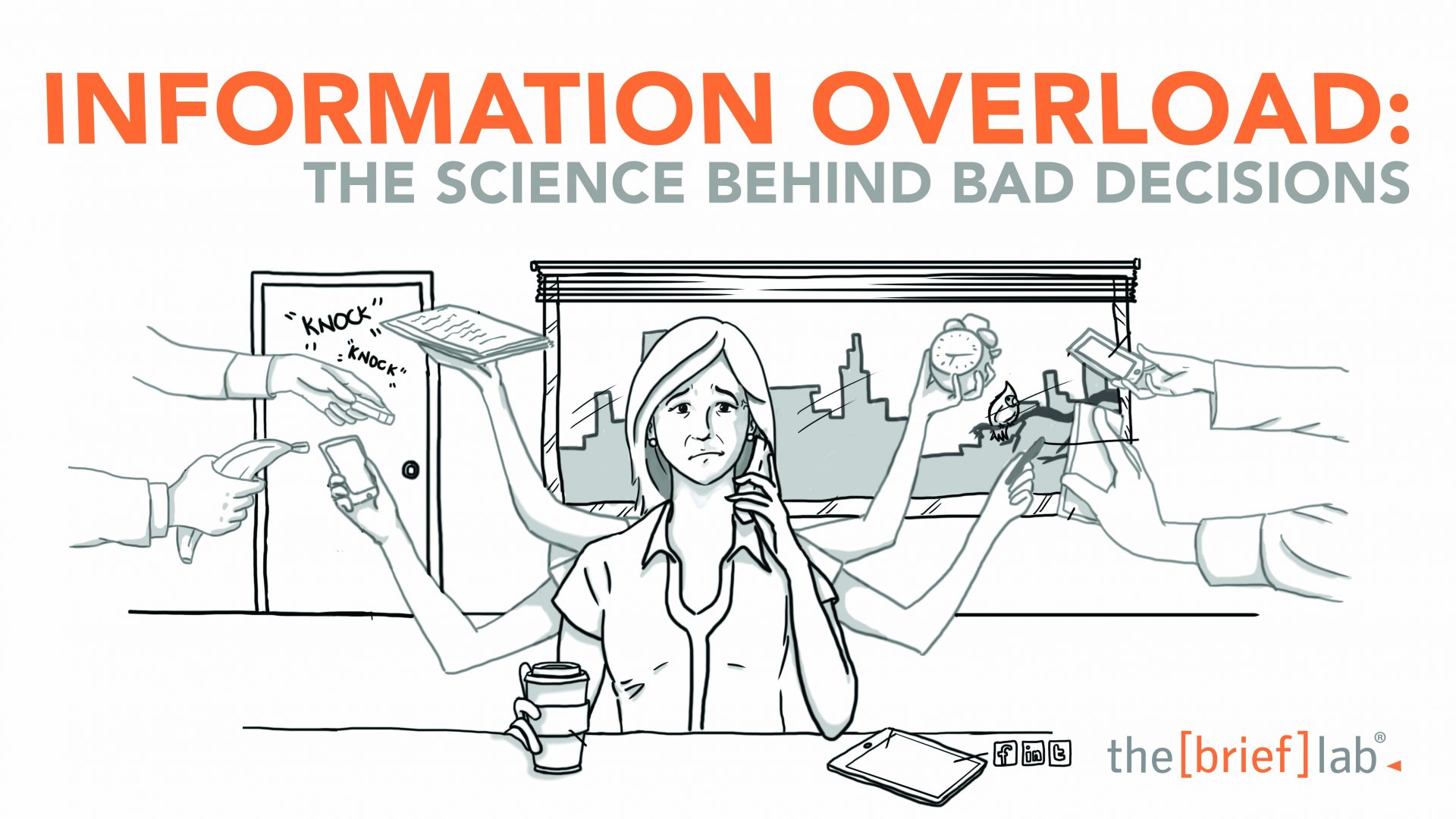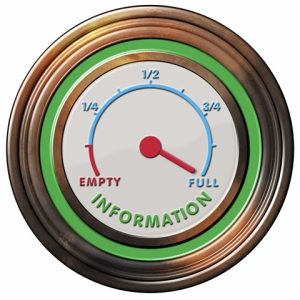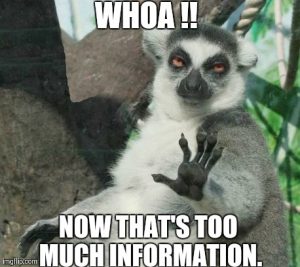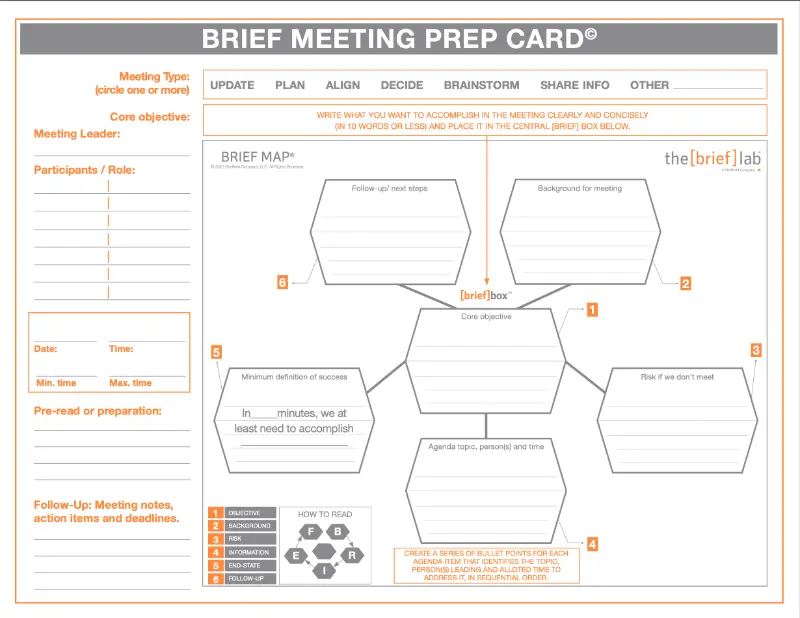 When we experience information overload, our brains reach their cognitive limit and our decision-making suffers tremendously. Ladies and gentlemen Elvis has left the building. And it has nothing to do with your intelligence.
When we experience information overload, our brains reach their cognitive limit and our decision-making suffers tremendously. Ladies and gentlemen Elvis has left the building. And it has nothing to do with your intelligence.
What if I make the wrong decision?
What’s the hardest choice you’ve made recently? Where to eat? Where the kids should go to school? Buying a house? Chances are it gave you some level of anxiety. What about making an important decision at work? Who should I hire? What are our most pressing priorities? Which vendor should I go with? Just thinking about all the possibilities, options and all the information we have to digest in order to make the most educated decision makes my heart skip a beat. How about you? The good news is that just because you struggle to make a decision, doesn’t mean you’re indecisive. It might just be that you have “too much information” to handle and you’re too maxed out to decide…aka information overload.
Information overload shuts our brains down
 Angelika Dimoka is the director of the Center for Neural Decision Making at Temple University. She uses fMRI scanning to measure brain activity during heavy decision-making processes. She’s found that as information load increases, so does activity in the brain responsible for both decision-making and control of our emotions. It turns out that there’s a limit to the amount we can handle. One study was conducted around bidders that had to consider a highly complex set of options. As the amount of information and options they have to consider increased beyond their limit, brain activity suddenly fell off as if there was a short circuit. It’s like exercising until the point of exhaustion. Once your body is maxed out, it shuts down. (Check out this wonderful Newsweek article that goes in more depth)
Angelika Dimoka is the director of the Center for Neural Decision Making at Temple University. She uses fMRI scanning to measure brain activity during heavy decision-making processes. She’s found that as information load increases, so does activity in the brain responsible for both decision-making and control of our emotions. It turns out that there’s a limit to the amount we can handle. One study was conducted around bidders that had to consider a highly complex set of options. As the amount of information and options they have to consider increased beyond their limit, brain activity suddenly fell off as if there was a short circuit. It’s like exercising until the point of exhaustion. Once your body is maxed out, it shuts down. (Check out this wonderful Newsweek article that goes in more depth)
It’s even worse in the workplace
So there’s that…and then there’s the fact that we live in a world of constant distraction and interruptions. How many times have you been distracted by text messages or Facebook in the past hour? Most of the time we don’t feel like we have a choice. Email chains that stretch for days, meetings that run over, boring presentations, endless conversations and updates…sometimes it can feel like drinking from a fire hose. Did you know that our short-term memory only has the capacity to retain 7 different items at once? That’s why telephone numbers are 7 digits. One more and you’d forget the neighbor kid’s number. (Here’s more on the lucky “memory” number 7) With all this information and all of these interruptions coming at us, how do we know what to focus on and what to ignore?
Less information leads to better decisions
First of all, we have to accept that decision-making is a numbers game. We have to find a way to receive less information so we can make more effective decisions without “freezing up” in the moment. There are a two ways to do that in the workplace:
1. Pay people who know how to distill information into it’s simplest form and have them present choices to you. Actually, rich people do that all the time. What’s that? You’re not a billionaire? That leads me to option two.
2. Prepare your people with a way to distill information into its simplest form and have them present. See what I did there?
You might not be a billionaire CEO (if you are see option 1) but you have a team and you need their help. That’s why you hired them. So how do we do that? Let’s start with understanding four basic truths about information overload.

The 4 truths
1. Too much information is harmful to your brain
2. Information overload leads to poor decision-making and mistakes
3. The more choices we have, the more challenging the decision
4. It’s not just the info that matters, it’s the way it’s presented
If you only make one decision today
Now there’s only one decision I’m asking you to make and here are the options.
A) Prepare your team or B) Pay for it
BONUS: Here’s something you can do and it only takes 10 minutes. Join us for two free lessons to cut team progress reports in half. Click here or the image to the right to check it out and share with your team. If you need any additional guidance, don’t hesitate to reach out directly. Thanks for your attention!
About the author: Matt Cornelison is on a mission to help people master concise communication at The BRIEF Lab. He specializes in storytelling and coaching executive communication. He works with top Fortune 500 companies from Harley Davidson to elite Special Operations Units within the Military. Follow Matt on Linkedin.

